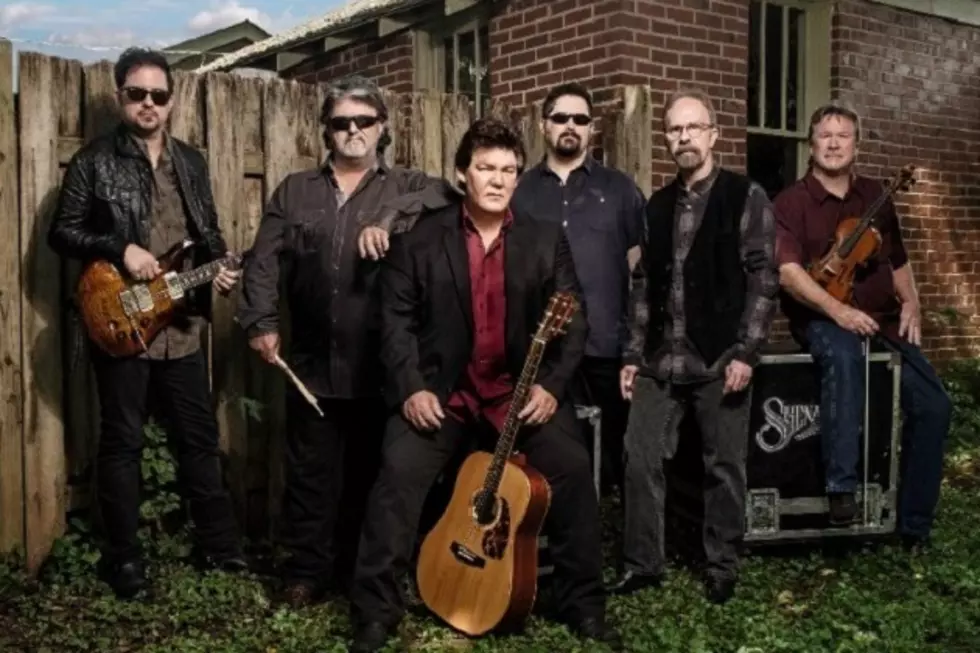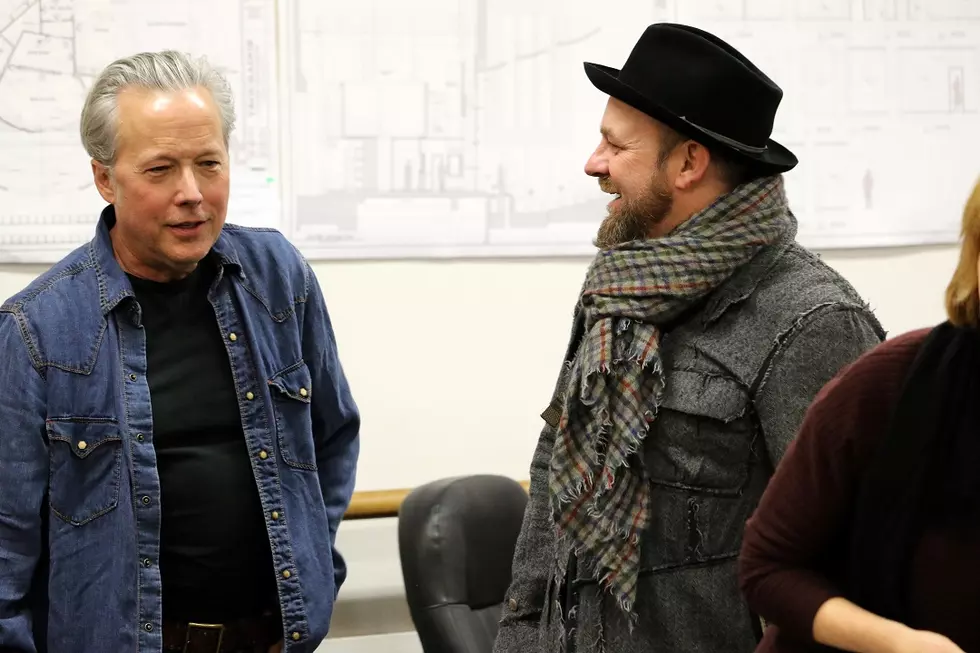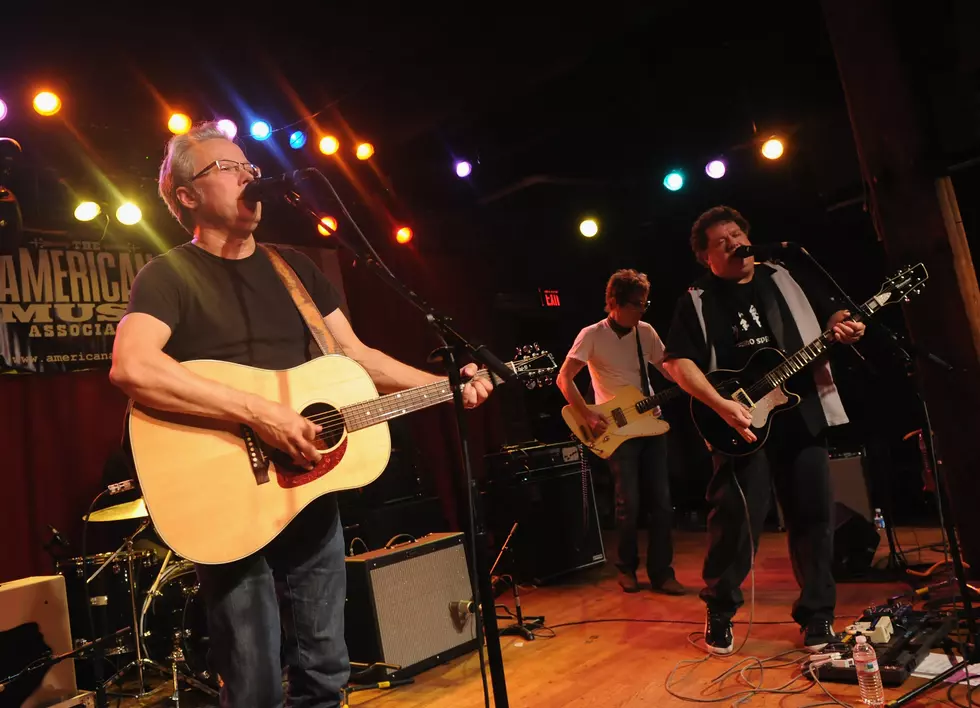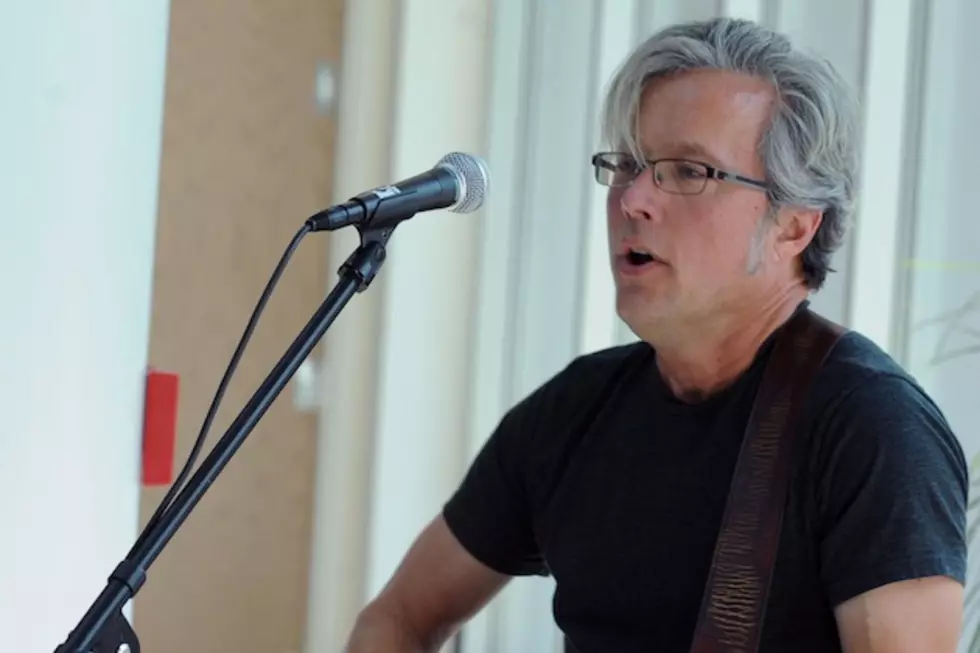
Foster & Lloyd Already Enjoying ‘Tomorrow’ Today
Radney Foster and Bill Lloyd, collectively known as Foster & Lloyd, stormed the country charts beginning in 1987 with four Top 10 hits, including 'Crazy Over You,' 'What Do You Want From Me This Time' and 'Sure Thing.' Their sound, hailed by critics and embraced by neo-traditional country fans, was a kinetic mixture of the Everly Brothers and Buck Owens, with splashes of the Beatles and other power-pop acts thrown in for good measure. Three full-length albums later, the duo's hits dried up and the two embarked on decidedly different -- yet occasionally overlapping solo careers.
Radney Foster released the solo disc, 'Del Rio, TX 1959,' scoring two Top 10 hits right out of the gate, including 'Just Call Me Lonesome' and the No. 2 hit, 'Nobody Wins.' While his solo efforts expanded his fan base, they also helped to strengthen his credibility as an in-demand songwriter. His 1999 album, 'See What You Want to See,' included three songs later recorded by a pair of country music's biggest acts, the Dixie Chicks ('Godspeed (Sweet Dreams')) and Keith Urban ('Raining on Sunday' and 'I'm In'). He also penned (with George Ducas) Sara Evans' No. 1 hit, 'A Real Fine Place to Start.' Radney's most recent solo disc, 'Revival,' was issued in 2009 and Darius Rucker, one of contemporary country's most successful artists of the past half-decade has routinely cited him as a huge influence on his career as a singer and songwriter.
In addition to a series of his own solo albums, singer-guitarist Bill Lloyd has also worked as producer for such legendary artists as Carl Perkins, played sessions for Buck Owens, Steve Earle, Ray Davies of the Kinks, and Squeeze frontman Glenn Tilbrook. He has also worked as a sideman for Marshall Crenshaw, Poco and Cheap Trick. As a songwriter, his tunes have been covered by Trisha Yearwood ('Trying to Love You'), Martina McBride ('Goin' to Work'), and Sara Evans ('Four-Thirty'), among others. He has also served as Stringed Instrument Curator at the Country Music Hall of Fame and Museum and Music Director at the First Amendment Center in Nashville.
While their mainstream country radio success may have been short-lived, their musical kinship, and more importantly their friendship has withstood the test of time. Now, for the first time since 1990, the two have released a full-length album, fittingly titled 'It's Already Tomorrow.' While their sound has matured just as much as the music business has evolved into a completely different animal, the rootsy country vibe of the highly-acclaimed trio of F&L albums released before they moved on to various solo projects remains.
The Boot sat down with Radney Foster and Bill Lloyd just prior to a Nashville music-industry event celebrating this week's release of 'It's Already Tomorrow,' to talk everything from the circumstances behind their first new album in 21 years, to what happens when they get together to sing and play. We also learned about an unusual request Kris Kristofferson made of Radney and the advice Willie Nelson gave him when the two first met.
Since it's been such a long time between albums, how do you plan to reconnect with fans of your hits and albums from the '80s?
Radney: The biggest way we're going to be able to do that -- outside of having a gazillion dollars to throw at radio, which we don't -- is social media. That's the biggest way we're going to be able to get it out to fans from the past.
Bill: Trying to find the old fans might be harder than easier but so far it's those people and their kids who've shown up to our shows.
Radney: The first week out we were the most-added at Americana [radio stations]. This week, we're tied for second most-added. We're already on the chart after two weeks. There is a level where there's another type of radio that's very amenable to what we're doing. I think there's a word-of-mouth thing on social media sites. I certainly know that with some of my songs, there have been situations where the word of mouth on YouTube drove the entire thing because there was no radio involved.
Bill: We're lucky we have plenty of residual goodwill after 20 years.
Radney: And there are actually guys at mainstream country stations calling up and going, "I don't know if this is a single or not, but how do I get a copy? Is there something on it I can play? We're gonna throw it into rotation."
Ultimately, what made you decide to record together again?
Radney: We got together and figured we can make this record inexpensively enough that even if nothing happened with it, we could break even. It was something we wanted to do. We did it for the right reason. We did it because we loved getting back together. We loved writing songs again. It happened organically and naturally; we didn't try to force it. I think really the biggest thing, we did a benefit concert for the Americana Music Association. Bill very smartly said, "We should write one new song." We booked two days [in the studio] so that we could be sure we finished, in case we wrote a dog first, or couldn't finish. We wrote two-and-a-half new songs in two days. They were really good. We played three new songs in that set: 'Picasso's Mandolin,' 'Just This Once,' and 'Hidin' Out.' The roof went off in the place. People went ape-nuts for the new stuff just as much as they did for the old chestnuts. We said, "Let's get together every Wednesday for the rest of the month." Of course, at the end of the month, we knew we wanted to make a record. About the second Wednesday, we were like, "We're gonna make a record!"
Bill: This is gonna happen when one way or another.
Has the process of writing songs together changed at all from the way you used to do it?
Bill: Only in as much as we've gotten older and both of us have written by ourselves and co-written with a ton of people over the years, to where you bring all that with you when you sit down.
Radney: We certainly know our way around writing a song better now than we did then.
Bill: But I think there is also a personality thing when we get together. Not only are we having fun writing, but some of that translates into the song.
Radney: We almost always, I would say 80 to 90 percent of the time, create a unique third thing that we would never have done on our own. It would not have happened if we had written on our own or taken it to another person. It would never have come out the same way. It really does have a whole new set of stuff.
Do both of you have individual strengths you bring into a writing session or to a performance?
Radney: He's strongest at being a smart-ass [laughs].
Bill: That's alright, it's true! But I can talk him into going with me. A lot of these things wouldn't sound right without the playful harmony in Radney's voice. I always go back to Buck Owens and the Buckaroos. You can always hear the smile in Buck's voice when he would sing. When he and [guitarist and harmony singer] Don Rich were together, they were having the time of their lives. I'd like to think Radney and I tap into that. We love that.
Radney: We've had so much fun on the road. It's one hoot after another. Every single set has a fun, new surprise. Or a new thing.
Bill: Usually it's the hiccups that are funniest.
Radney: What's great is when the hiccup turns into something cool that you didn't do on the record. "Gosh, why didn't we think of that!" It leads you to another place. Leads to a solo in an odd spot or a jam at the end.
Have the old, well, let's say the classic Foster & Lloyd songs changed for you in any way?
Bill: Let's face it. They're old [laughs].
Radney: Oh yeah, I think so. In a lot of ways. A lot of the rockers ... 'Faster and Louder' certainly rocks harder now than when we first wrote it. I think because I play more electric guitar than I used to. Now, it definitely feels more Rockpile than in the past. Yet, I think there is an element to certain things where because we didn't have any parameters of, "We can't use that chord there's no ninths in country music! But there is in the song. Sure we can!"
Bill: I think Willie Nelson proved there were no "out of town" chords. He was always throwing jazz and everything else into the mix. We were also writing at the time, in the old days, always aware of what we thought or imagined the country radio format to be.
Radney: Everyone was saying, "Oh my God, they're breaking the mold left and right!"
Bill: We were struggling to stay in between the lines but we always tried to keep it in there.
Radney: I don't think we did it out of fear as much as we did it out of love. We loved the Everlys, we loved Buck Owens. We loved Merle Haggard, the Louvin Brothers stuff.
Bill: We loved the opportunity at the time being signed to RCA, a major label. We wanted to honor that agreement and bring them stuff they could work with and be true to ourselves at the same time. Amazingly, I don't know of any other act going back that self-produced themselves and wrote all the songs themselves.
Randy: And what country act today ... we were openly, brashingly, listing Buck Owens and the Everlys, but we were also listing the Beatles and the Clash as influences on what we were doing.
What ultimately led to your breaking up the act after just three albums?
Radney: I think it was several reasons. The first of which was we did three records all on our own, completely unfettered. We were successful with the first two. By the time we got to the third record, because there had been a hiccup in the success, we felt more pressure ... naturally so. We needed to let someone else take the reigns. There was talk at that time that we'd be going to rock, RCA in New York. We had such college rock success. For me, that felt like such a crap shoot. My voice is so country, there is no way I could go rock, like Buck Owens said, he "couldn't go pop with a mouthful of firecrackers."
Bill: Our second album was called 'Faster & Llouder,' even though it's sort of a play on our name.
Radney: The first single from it ['Fair Shake'] was a Top 5 hit. [The partnership] kind of just had a natural fruition of falling apart. There was never really a lot of animosity about it. There were certainly some touchy conversations, but ... I was proud of us both for remaining good friends for a long time. We never lost that.
Bill: We started playing reunion shows within 4 or 5 years after we split.
Radney: Somebody would ask and we'd be, "Sure!" There was a guy in North Carolina. I was playing on a Friday and Bill was playing on a Saturday night. The promoter was like, "I have Foster and Lloyd in the same town!" He asked us to do an afternoon show as Foster & Lloyd and we used half my band and half his band and it worked great!
Bill: We went to Switzerland with Alison Krauss. Every so often, we'd do something for charity or someone would offer us a trip to Switzerland and we'd do it [laughs].
What advice do you both have for new artists in the business these days?
Bill: Given the climate, be prepared to make that the only thing you think about. If you can't, don't do it.
Radney: If you can be happy doing anything else in the world, go do that. It takes a complete commitment. And Willie Nelson's first advice to me, there was a movie and I was driving [people around town for it]. He said, "Keep writing." And Kris Kristofferson asked me to get him a cheeseburger. That was the highlight of my year.
One of the songs on the new album, 'Picasso's Mandolin,' was written with Guy Clark. What's the story behind that song?
Radney: [On Music Row], where EMI Music is, that used to be Combine Music, originally. It was just a house. And Guy, when EMI called him and wanted to talk about signing a publishing deal, the story I was told was that he looked around and went through the whole thing. He said, "Where does that staircase lead?" They said, "That just leads to the attic." He goes up to the attic and there a dormer, so he said, "Well, if you wall-off this space and put a window unit in one of these dormers, I'll sign the deal." They did, so he said, "I need a phone," so he didn't have to go down three flights to answer the phone. There are two stories about this. We get this call from our manager asking, "Are you interested in writing with Guy Clark?" "Holy crap! Are you kidding me?" We went up to his attic. He's got all of this stuff that looks so cool. He's got all of these cassettes of tons of other people's songs. Mary Chapin Carpenter would play a song in front of him. He would ask her to play it again so he could record it. It was a really fascinating place. He had this mandolin that was badly maimed, to say the least. It looked like it could have been Picasso's mandolin. We looked at each other and it was like, "That is a song title!"
Bill: We had to decide, "What does that mean?" Guy just kinda hit right on it, being Guy Clark. He kinda went, "Doing what you want to do."
Radney: Doing it your way. Doing it like Picasso. So that's how we wrote the song. That was the second song we wrote with him. The first was "Fair Shake."
So what's the second story about writing with him?
Radney: The second story is we were sitting there trying to write with Guy Clark. We were ... just terrified but we were bringing it. We had an idea. Things were going along, but halfway through, his big black phone rings. He's like, "Hey, I'm writing with the boys of Foster & Lloyd and it's a pretty good song." He put his hand over the phone and said, "Do you boys mind if Townes van Zandt comes down?" He hangs up the phone and we're trying to keep it together to write a song.
Bill: We were waiting for Waylon [Jennings] and Willie [Nelson]!
Radney: All of a sudden, in the street, we hear this beep beep beep. We look out the window and throw the sash open. Van Zandt has got a new crème-colored Vespa with matching Italian leather and is cutting donuts in the middle of 17th Avenue. He wanted to show us his new scooter. So he came by and came upstairs and no more songwriting got done. But it was great. Afterwards, he was so kind to us. He said, "They just put my entire catalog on CD and I want to send it to y'all." I thought he'd never remember, but it came in the mail two weeks later.
More From TheBoot





![Radney Foster Looks Back in Time With ‘California’ Lyric Video [WATCH]](http://townsquare.media/site/623/files/2014/10/129166552.jpg?w=980&q=75)



